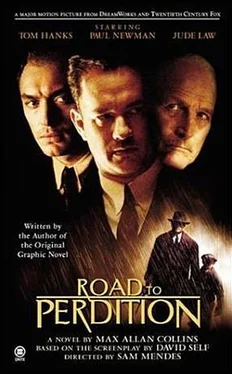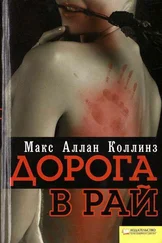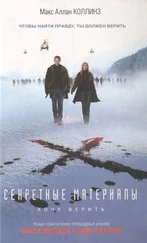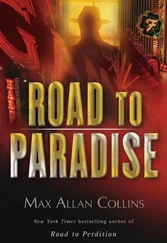So we had our graveside good-byes, after all .
I remember kneeling at Mama’s simple gravestone, next to Peter’s, and saying, “We should have brought flowers.”
And Papa said, “That’s all right, Michael. It’s still too cold for flowers.”
That had troubled me, and I asked, “Is Mama cold?”
“She’s free of earthly concerns, son.”
My father is buried next to them, now; and one day — one day soon — I will join them in the Village of the Dead. Connor Looney is buried in Chippiannock, too. When I first heard, I thought that was a terrible thing — even the ground should be more discriminating .
But with the passage of years, I’ve come to see the rightness of it. We were bound together in life and death, all of us, and my father, mother, and brother will be forever linked to the Looneys, as will I, at least as long as people are interested in the history of that lefthanded form of human endeavor called crime .
John Looney, unfortunately, is not buried at Chippiannock. His grave is at his ranch in New Mexico, next to his wife’s, one last getaway from Tri-Cities trouble .
They say he was packed and ready to go to Chama, that rainy Sunday night; he could have caught an afternoon train, but instead he lingered, for reasons of his own. Perhaps he had pressing business that needed tending before he could leave .
Or maybe the old man had a sense of his destiny. Maybe he believed in fate — though I’m not convinced he believed in anything at all .
The Paradise Hotel was in downtown Prophetstown, near the Tri-Cities, on the way to Chicago. Nondescript, almost rundown, the three-story frame building was anything but paradise, the kind of lodgings the less successful traveling salesmen resorted to in these hard times.
The boy was asleep in his clothes on top of one of the twin beds in a room whose yellowish wainscoted walls had grime and stains from the decades that had passed since the hotel’s heyday. A naked bulb screwed in the wall provided the only illumination; O’Sullivan switched it off, and sat on the bed next to the boy. Rain streaked the windows, and its reflected shimmer made patterns on the slumbering child. Thunder rumbled, sounding distant, but a threat nonetheless.
O’Sullivan was in the same suit he’d worn to the church today. He wore no tie. This was the end of the road and he knew it — and he knew what had to be done, knew now the only way that Capone and Nitti would give up Connor to him.
Because he had phone calls to make, and other preparations, O’Sullivan had taken the adjoining room, as well; and he’d made his arrangement with the desk clerk for the long-distance calls.
From that adjoining room, he sat at a table, a work area where salesman and businessmen could go over their receipts and records, and used the phone. Shabby, sparsely furnished, these two rooms did not constitute a suite worthy of, say, Alexander Rance. But it suited Mike O’Sullivan’s purposes just fine.
He did not reach Nitti at first. Someone at the Lexington asked for a number where Mr. Nitti could return the call, and O’Sullivan refused to play along.
“Tell Nitti,” he said into the receiver, “that Mike O’Sullivan will call again — in one hour.”
Then O’Sullivan hung up. Still seated at the table, he made out a list of banks and safe deposit box numbers on a sheet of Hotel Paradise letterhead; he wrote “Michael” on an envelope and inserted the sheet into that, with eight little keys folded up inside — also included were Uncle Bob’s phone number and directions to the farm on the lake. Then he slipped in a fat wad of cash, enough to carry the boy for weeks, perhaps months, and licked the flap and sealed it shut.
O’Sullivan went back in where his son slept, and placed the envelope on the scarred nightstand, where a fat little Lone Ranger book lay folded open next to the boy’s small revolver. Again he sat beside Michael and looked at him for a long time — studying him, committing to memory every detail of the child, as if he hoped to recognize the boy in some other lifetime.
Then he stroked his son’s hair, thinking how much he loved the child, hoping Michael knew, and got up and returned to the next room, not realizing the boy had only been pretending to be asleep.
Alone in the room now, Michael eyed the letter on the nightstand suspiciously. The word “good-bye” seemed to rise off the envelope like steam. Glancing toward where his father had gone, the boy saw a strip of light along the doorway’s edge. He rose and went to the door, nudging it open another crack, and peeked in.
His father sat at a table, the hard-shell black case before him, closed; like a master musician, he unsnapped the clasps, lifted the lid, and revealed the protectively nestled parts of his instrument — the tommy gun, which had been with them on their journey, but had gone as yet unused.
Michael was amazed by the speed, the precision of it: piece by piece, checking each one, his father assembled the gun quickly, efficiently, snapping the parts together, tiny loud mechanical clicks and clacks, each one making the boy flinch. Michael had seen his father like this many times on the road — intense, methodical, precise; but something seemed different tonight. Papa was preparing not just the gun, but himself — snapping his own parts together, somehow.
Steeling himself.
Finally, the drum of ammunition was clicked in place onto the assembled machine gun, and the boy went in.
O’Sullivan turned to him, with an expression almost like a kid getting caught doing something he shouldn’t — the gun before him like the contents of a forbidden cookie jar.
“What are you doing?” the boy asked sternly.
“Preparing myself.”
“For what?”
“For the one last thing that has to be done.”
“And then?”
“Then we’re free of it, son.”
Michael just stood there in his rumpled clothes, and stared at his father with blank accusation.
Papa, not irritated, even gentle, said, “Go back to bed, Michael.”
“Who are you going to kill?”
“Michael... ”
“I know I should want you to kill Mama’s and Peter’s killer. But right now I just want us to go off somewhere. Even if it is Perdition.”
“This is perdition, son.”
“What?”
“Son — go to bed.”
“Shall I say my prayers, Papa?”
“If you like.”
“Because I’m a sinner, too, Papa? Helping you like I have?”
He shook his head. “We’re all sinners, son. That’s the way we enter this world. But we can leave it forgiven.”
The boy knew what that meant — more candles. But he had been skeptical when the nuns at the Villa taught him theology, and he was skeptical now, when a man holding a machine gun was giving the lesson.
“You’re leaving me here,” Michael said — the accusation boldly out in front of them both.
“... I’ll be gone tonight... tomorrow morning, I’ll be back.”
“If you don’t get killed, you mean.”
His father shot him a look. “Michael — I’ll be back. I promise.”
But neither of them quite believed it.
And nothing was left to say. The boy stumbled off to his bed, and the man took one last look at the machine gun before moving on to his Colt .45 automatic, which could use a cleaning.
When he was done, O’Sullivan made his phone call.
For several hours that rainy evening, at the small restaurant in downtown Rock Island, not far from his newspaper office on Second Avenue, John Looney met with certain key associates. Looney was handling his own legal matters now, since the demise of Frank Kelly, and he needed to make sure the wheels would move smoothly while he had his little rest out at the ranch.
Читать дальше












